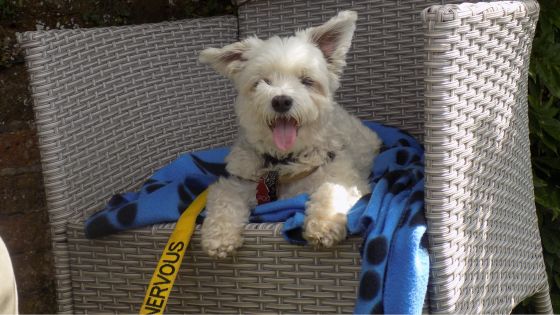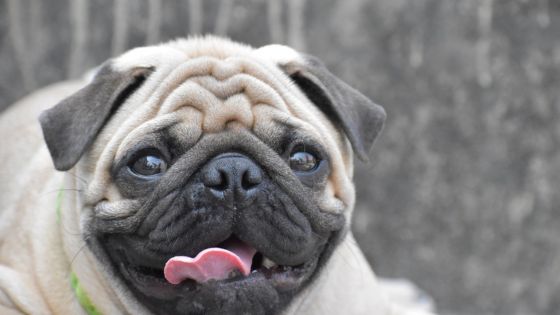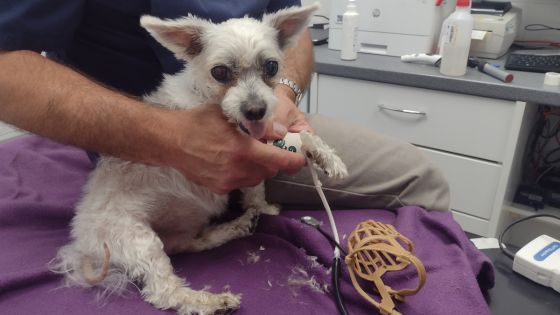It’s normal for a dog to pant, but how can you tell the difference between what’s normal in a senior dog and what isn’t?
It’s normal for a dog to pant after a hike, if it’s hot out, he’s feeling anxious or just because he’s excited to see you. When it becomes a concern is if he’s doing it when there’s no reason, he’s panting heavier than normal or long after any reasonable scenario to explain it has passed.
NOTE: If your senior dog is panting and you aren’t sure why, please see your vet as soon as possible. The sooner an issue is discovered, the better the chances it can be treated or at least managed.
Why is My Dog Panting for No Reason?
There’s always a reason for a dog to pant, the question really is whether or not there is a reason to be concerned. Let’s start by taking a look at what can cause a dog to pant.
Heatstroke
Just like we can suffer heatstroke in hot weather, so can dogs…and if not treated immediately they can die within minutes.
In addition to rapid panting and breathing, other signs of heatstroke are:
- Skin almost hot to the touch
- Dark red gums
- Unable to move
- Blank stare, little eye movement
- Dizziness/disorientation
- May lose urine and bowel function
- Convulsions, seizures, vomiting
- Coma, leading to brain damage and shutting down of internal organs
Here’s what to do
- Move the dog to a cool or shady area
- Put wet rags on him or sprinkle him with cool water, especially around his head and paws (never use cold/ice water – it constricts the blood vessels)
- Use a fan, hands, or piece of paper over his body, to help water evaporate
- Give him a drink, but don’t force it
- Take him to a vet immediately, even if you think he’s better
They’re hot

Feeling the heat and panting to cool down is the most obvious reason. Dogs don’t sweat like we do, so they pant to cool off and regulate body temperature. Giving your dog a drink when you’re out in the hot weather, walking on the shady side of the street and going out earlier in the morning and later in the evening are the best ways to handle exercising in the summer months.
Excitement
Maybe your dog is just so excited about FILL IN THE BLANK, he’s jumping around and it’s making him pant.
Poisoning
Rat poison, slug killer, anti freeze and eating too much chocolate are just some of the things your dog can ingest that are poisonous. If you think your dog ate something dangerous, call the pet poison helpline or your vet right away.
Adverse reaction to medication
Drugs such as Tramadol and Prednisone can cause dogs to pant. If your vet has prescribed a new medication for your dog, be sure and ask him what some of the side effects may be. It’s possible your dog won’t suffer any adverse reaction, but knowing the possibilities will at least explain any new behaviors such as panting, for example.
Obesity
With over 50% of the dogs in the U.S. considered overweight or obese, it’s a serious issue with long term consequences. Not only does it cause panting, it increases the chances of a dog getting diabetes, heart disease and makes arthritis pain even worse.
For tips on weight loss, read this ⇒ “How to Help a Fat Dog Lose Weight“
Nausea
If your dog is feeling nauseous or is going to throw up, you’ll often see them panting.
Anaemia
Red blood cells transport oxygen around the body, but anaemia means a reduction in the number of those cells. This can lead to oxygen deprivation, and a dog panting more to compensate.
Play time
Whether you’re playing fetch together or he’s running around the park with his doggie friends, panting is normal in those scenarios.
Brachycephalic syndrome

The inability to breathe normally is a common problem in brachycephalic dogs, or brachy dogs as they are also called. Those are dogs with flat faces like Boston Terriers, Pugs, Bulldogs and Boxers. The condition, called Brachycephalic Obstructive Airway Syndrome (BOAS) is caused by a narrowing of the upper respiratory tract.
Obesity makes this condition worse, so if your dog needs to lose some weight here is the motivation you need to get started. Most vets have a weight loss clinic to help guide you.
Controlling exercise levels, keeping dogs in air conditioned surroundings in the summer, corticosteroids, nonsteroidal anti inflammatory drugs and surgery are all treatment options depending on the severity of the condition.
Congestive heart failure
Not uncommon in senior dogs, this happens when the heart can’t pump enough blood to the rest of the body, causing things like excessive panting, coughing, lethargy and loss of appetite to name a few of the effects. Depending on how advanced the condition is, medication may give your dog months or years of good quality life. It certainly did for my dog!
Pain
Dogs are notoriously good at hiding pain. In the wild it was used as a survival tactic but in modern day family life, your pup can be suffering without anyone realising. One of the first signs of pain is panting, and you’ll often see that before you notice anything obvious. Licking or chewing a particular area and possible aggressive behavior, especially if you inadvertently touch a sore area, are also common signs.
“5 Effective Ways to Reduce Pain in Dogs With Arthritis”
Cushing’s disease
This is the result of a dog’s adrenal glands producing too much cortisol. Typically a disease in older dogs, they eat, drink, pee and pant more. Other signs you may notice are fur loss and a pot belly.
Cushing’s shares some of the same symptoms as other illnesses, so if standard blood tests come back normal, make sure your vet tests for Cushing’s.
Respiratory issues
- Bronchitis or pneumonia
- Lung tumors
- Build up of fluid in the lungs
- Obstruction
- Laryngeal paralysis – This happens when the muscles and cartilage that open and close the larynx malfunction. When a dog with this condition breathes in, the laryngeal cartilages do not open properly, making breathing difficult. Restricted airflow and loud, raspy panting is the result.
Anxiety/stress/fear/phobia
Panting can be the result of anxiety, stress, fear and phobias and can be caused by:
- Vision issues/loss
- Hearing issues/loss
- Separation anxiety
- Thunderstorms/fireworks
- Dementia (confusion and memory loss)
Here are some articles filled with tips on how to help your dog if he or she is suffering from any of the above.
“A Comprehensive Guide to Dog Dementia”
Post surgery
Panting, drooling, moaning and shivering are some of the behaviors you can expect to see after surgery. Sometimes it’s due to pain, but usually because of the anesthetic. Have a conversation with your vet about what your dog may experience, how long it’s expected to last, and most importantly what you can do to make him or her comfortable.
“Is Anesthesia Safe for Senior Dogs”
High Blood Pressure

High blood pressure, also called hypertension, can happen in dogs and are often the result of things like:
- Obesity
- Cushing’s
- Diabetes
- Liver disease
When Your Dog’s Panting Requires a Vet Visit
- Restless and panting
- Seems to have trouble breathing
- Panting in a way that isn’t normal for him or her
- Doesn’t stop
- Shaking
- Tongue or gums are not their normal color
- When there’s no obvious reason why – for example: it’s not hot outside, no one has walked in the door to get him excited…
If you’re at all concerned, make that call. It’s better to go and find out it’s nothing, than wait too long and discover nothing can be done.
Explain your concerns on the phone, and have them fit you in that day, or at least the next. Offer to sit in the waiting room if that’s what it will take! If they refuse to see you for whatever reason and you’re worried, find someone who can.
Appointments can be stressful, time is limited and we often remember key pieces of information once we’re out the door. Preparing a list and bringing it with you will make your time with the vet a lot more productive.
- What your concerns are
- How long has he been panting?
- Does it happen more at a certain time of day?
- Any other new/unusual behaviors you’ve noticed
- When did they start? At the same time? Before? Since?
- Mention any new drugs, supplements or even diet he’s on
- New routines or changes in the home
How to Stop a Dog from Panting
There isn’t one set way to deal with panting, because there isn’t just one cause, as you’ve seen above.
If you’ve realised the heat is an issue…
- Walk him earlier in the morning and later in the evening
- Buy a chill bandana, jacket and/or mat for him to lay on
- If you don’t have air conditioning get a small fan and put it in the area where he hangs out
- Ice cubes in his water bowl will keep the water at a better temperature
If you really don’t know, then a vet visit is a priority. He will conduct a physical exam and any extra tests he feels are needed to help with a diagnosis. Once he has the results he will discuss a treatment plan with you. Hopefully that will at least reduce the panting and make him more comfortable.
Has your dog been experiencing panting? What was the cause and what have you been doing to help? Sharing helps others, so please leave your comments below.
If you’re looking for a community of senior dog parents, a place where you can find helpful tips, support and people who “get it” please join my FB group Senior Dog Care Club
I’m excited to announce my new Senior Dog Care Support Service.
I offer 1:1 support on everything from health & wellness advice and training tips, to preparing to say goodbye and grief counselling. You can find details on all the packages I offer by visiting the Senior Dog Care Support Service page. If you have any questions or would like to book your FREE 15 minute chat, please email hpearson141@gmail.com
I’ve been rescuing and caring for senior dogs since 2009. From vision and hearing loss to obesity, dementia, kidney disease, liver issues, cardiac problems, Cushing’s, mobility challenges and more, you could say I’ve dealt with and learned a lot! In addition to my hands on experience, I’ve taken many courses and earned several qualifications to keep learning how to help senior dogs and they include: Senior Dog Enrichment, Understanding Canine Anxiety, Care of the Senior Pet and I’m a Certified Pet Loss Specialist.
